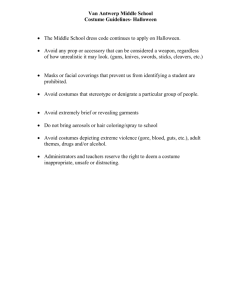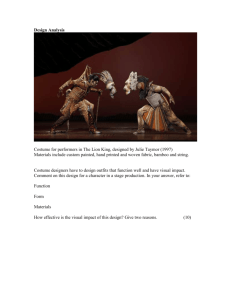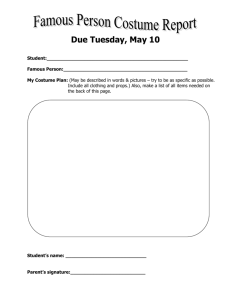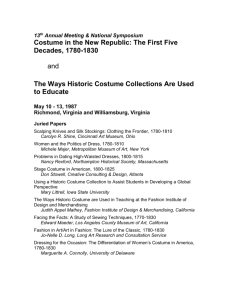stage couture syllabus spring 2011 dolan.doc
advertisement
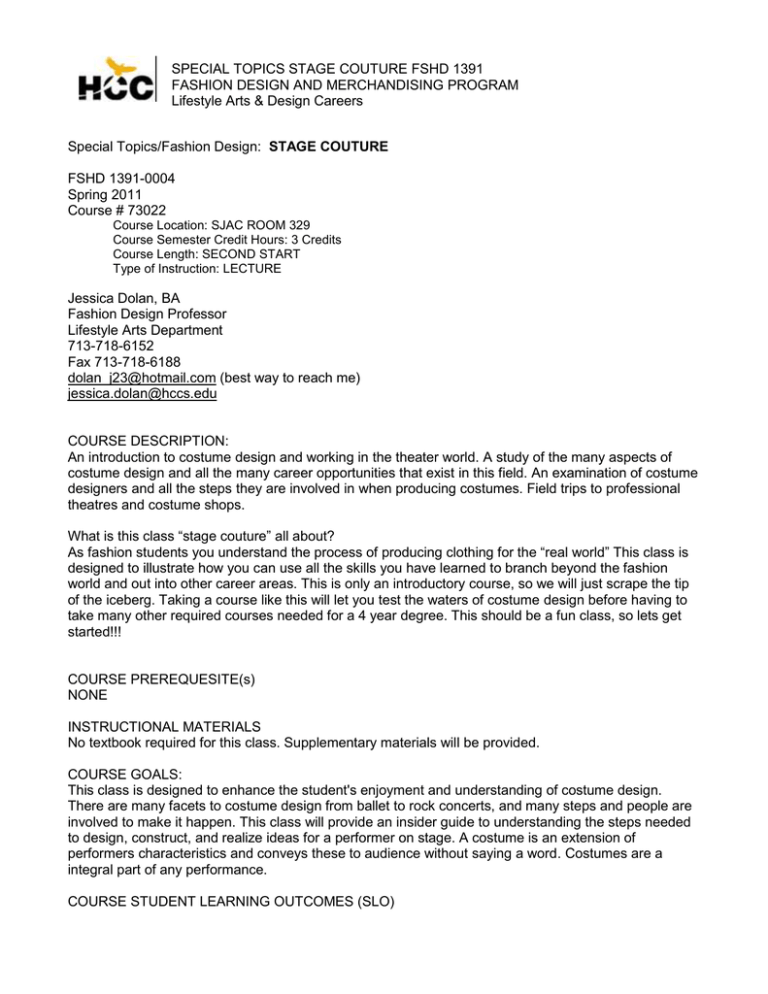
SPECIAL TOPICS STAGE COUTURE FSHD 1391 FASHION DESIGN AND MERCHANDISING PROGRAM Lifestyle Arts & Design Careers Special Topics/Fashion Design: STAGE COUTURE FSHD 1391-0004 Spring 2011 Course # 73022 Course Location: SJAC ROOM 329 Course Semester Credit Hours: 3 Credits Course Length: SECOND START Type of Instruction: LECTURE Jessica Dolan, BA Fashion Design Professor Lifestyle Arts Department 713-718-6152 Fax 713-718-6188 dolan_j23@hotmail.com (best way to reach me) jessica.dolan@hccs.edu COURSE DESCRIPTION: An introduction to costume design and working in the theater world. A study of the many aspects of costume design and all the many career opportunities that exist in this field. An examination of costume designers and all the steps they are involved in when producing costumes. Field trips to professional theatres and costume shops. What is this class “stage couture” all about? As fashion students you understand the process of producing clothing for the “real world” This class is designed to illustrate how you can use all the skills you have learned to branch beyond the fashion world and out into other career areas. This is only an introductory course, so we will just scrape the tip of the iceberg. Taking a course like this will let you test the waters of costume design before having to take many other required courses needed for a 4 year degree. This should be a fun class, so lets get started!!! COURSE PREREQUESITE(s) NONE INSTRUCTIONAL MATERIALS No textbook required for this class. Supplementary materials will be provided. COURSE GOALS: This class is designed to enhance the student's enjoyment and understanding of costume design. There are many facets to costume design from ballet to rock concerts, and many steps and people are involved to make it happen. This class will provide an insider guide to understanding the steps needed to design, construct, and realize ideas for a performer on stage. A costume is an extension of performers characteristics and conveys these to audience without saying a word. Costumes are a integral part of any performance. COURSE STUDENT LEARNING OUTCOMES (SLO) SPECIAL TOPICS STAGE COUTURE FSHD 1391 FASHION DESIGN AND MERCHANDISING PROGRAM Lifestyle Arts & Design Careers 1. 2. 3. 4. 5. 6. 7. Identify characteristics of performer through costume alone. Recognize the many areas of costume design. Describe the hierarchy of a costume workshop. Understand the inner workings of backstage production crew. Realize the use of clothing to create time and environment in a production. Know the elements necessary when designing costumes. Identify and describe costume designers involved with stage, television, film, and more Course Content Understand the power of costume design. How garments explains characteristics of actor without having to say a word. Describe how costume design differs from type of production. (ex. Ballet vs. opera) Describe the functions of the various theatre personnel Define specific terms relating to the study of theatre Prepare for working backstage for a live show. Learn about the many career opportunities in theater world Develop an appreciation for theatre as an art form and a reflection of society Costume Designers: Oral and written reports on selected costume designers. This course outline may be altered at instructor’s discretion. CLASS ATTENDANCE IS IMPORTANT. It is the policy of the department that there are no excused absences. Just as in the workforce, students absent from class are still responsible for all material assigned and/or covered during the missed session. Attending class lectures and labs is vital to understanding, integrating, and applying the concepts discussed in class. Generally, if a text is required for the course, the course material is covered in the text; however, lectures, exercises, and assignments augment and clarify the textbook material. You are encouraged to get to know your fellow students in order to have a source for lecture notes and handouts if you cannot attend a class session. Students are expected to assume the responsibility for learning. Your instructor may choose to assist you, but the actual responsibility rests with you. PLEASE BE COURTEOUS. Students arriving late or leaving early should notify the instructor ahead of time, and sit in a seating location that is least likely to disrupt the class. Disruptive activity that hinders other students' learning or deters an instructor from effective teaching will not be tolerated under any circumstances. If a student arrives more than 10 minutes late for any scheduled class times or presentations, the instructor may lock the classroom door and the student will not receive credit for that class. DON'T MISS CLASS OR ARRIVE LATE! Your attendance score accounts for 10% of your final grade. Five points will be deducted from your attendance score for every class that you miss and/or for which you are more than five minutes late. In accordance with HCC Policy, if you miss more than 12.5% of your scheduled classes (i.e. 4 classes during a regular 16-week course; 3 classes during a 12-week semester) you will be dropped from the course. Dropping this course is the responsibility of the student, NOT the instructor. If the student has not withdrawn from the course by the last drop-date (for this date, please consult this semester's official HCC Academic Calendar), the student will receive a failing grade. If any student exceeds the allowable SPECIAL TOPICS STAGE COUTURE FSHD 1391 FASHION DESIGN AND MERCHANDISING PROGRAM Lifestyle Arts & Design Careers absenteeism after the last withdrawal date, fifteen points will be deducted for every missed class time. The Fashion Department adheres to the HCC Religious Policy. Fashion and Interior Design Department Attendance and Participation Policy: Classes that meet once per week: 0 Absences..............100 Attendance and Participation Grade 1 Absences................95 Attendance and Participation Grade 2 Absences................80 Attendance and Participation Grade 3 Absences................50 Attendance and Participation Grade Over 3 Absences.........0 Attendance and Participation Grade Three tardies (up to 15 minutes late) equal one absence. More than 15 minutes late will be recorded as an absence. HCC COURSE WITHDRAWAL POLICY. The State of Texas has begun to impose penalties on students who drop courses excessively. For example, if you repeat the same course more than twice, you have to pay extra tuition. Beginning in Fall 2007, the Texas Legislature passed a law limiting first time entering freshmen to no more than SIX total course withdrawals throughout their educational career in obtaining a certificate and/or degree. To help students avoid having to drop/withdraw from any class, HCC has instituted an Early Alert process by which your professor may "alert" you and Central College counselors that you might fail a class because of excessive absences and/or poor academic performance. It is your responsibility to visit with your professor and counselor to learn about what, if any, HCC interventions might be available to assist you - online tutoring, child care, financial aid, job placement, etc. - to stay in class and improve your academic performance. If you plan on withdrawing from your class, you MUST contact a counselor or your professor prior to withdrawing (dropping) the class for approval and this must be done PRIOR to the withdrawal deadline to receive a "W" on your transcript. **Final withdrawal deadlines vary each semester and/or depending on class length, please visit the online registration calendars, HCC schedule of classes and catalog, any HCC Registration Office, or any HCC counselor to determine class withdrawal deadlines. Remember to allow a 24-hour response time when cornmunicatinq via email and/or telephone with a professor .and/or counselor. Do not submit a request to discuss withdrawal options less than a day before the deadline. If you do not withdraw before the deadline, you will receive the grade that you are making in the class as your final grade. HCC Central College Counselors may be reached via phone at 713.718.6120, or you may visit them in SJAC 114. STUDENT ASSIGNMENTS This is a project based class, there will no exams. Era/Time period mood board Movie Critique Costume Designer Report 3 color sketches with swatches Live performance critique HISTORICAL MOODBOARD: Each student will be assigned a different era. Compile a collaged poster with examples of fashions, hairstyles, makeup trends, accessories, of that time. What details were popular at that time? (ex sleeve lengths, necklines, hemlines, accessories, etc) Also include objects that were popular at that time (ex hotrods in the 50s), environment (a countryside cottage, a club on the sunset strip in the 80s), etc to SPECIAL TOPICS STAGE COUTURE FSHD 1391 FASHION DESIGN AND MERCHANDISING PROGRAM Lifestyle Arts & Design Careers help set the mood of your board. Try to create a mini world from each of the historic eras. This is to simulate the research collecting that you would do as a designer before designing a show. Being historically accurate in costume design is extremely important, and necessary in order to transport the audience to that particular time and place. COSTUMES IN A MOVIE REVIEW Choose a movie that has a definite time period or costume theme. This will make review a little easier to write. Answer the same questions as in the live performance review assignment. Could these costumes work in a live stage show, or is it specific to the movie making genre? Ex. The Wolfman could be adapted to stage, but the makeup effects would have to be minimized for time purposes. The beauty of film is that time is not an issue; a scene can be done over and over again until the right take occurs. Live theater has time constraints and a realm of other limitations in comparison to movies. Again choose a movie you are interested in, your enthusiasm will shine through in your analysis. You can see a movie in the theater, rent one, or watch it on tv. Be ready to talk about this in class. COSTUME DESIGNER REPORT: There are so many talented costume designers both past and present. You can choose someone from old Hollywood to a costumer for television today. Think of a movie, ballet, play, TV show, etc you love. Search the credits, or Google to find out who the designer is. Each student will choose a different costume designer about whom to write a short paper. It should be a minimum length of 2 typewritten, double-spaced pages concerning the life, education, career climb, and characteristics of this designer’s work. Include a title page, at least 3 references and illustrations of the designer’s work. Oral presentations of these reports will be made in class. I will have my computer and projector if you want to create a slideshow, or other media enhancement. 3 COLOR SKETCHES WITH SWATCHES: This is a fun fantasy project. You have the freedom to design 3 costumes. These will not be constructed, but you need to think through what closures, fabrics, seam finishes, etc would be used if it were. What is the silhouette? Why color would look great on the performer? What is the fabric like? What length should the hemline be? Etc. Try and pretend you are doing this for real. A designer’s job is to assemble ideas from research and create a costume that reflects the wearers personality, image, and status. Keep these things in mind when you are coming up with your ideas. Could we look at your design and say “ I definitely see her wearing that!” I would like you to design 3 costumes: 1 for a musical performer 1 for a movie character 1 for Halloween Please chose people you admire or are interested in, not who you think we want to see. If you are drawn to a certain style, pursue that direction. Diversity is encouraged! Include color renderings complete with swatches to show fabric colors and textures. Please have a large enough piece of fabric so we can see the color, texture, and pattern clearly. If you have any trims or notions you should also attach with fabric samples. Do not worry about your sketching skills, we are all on different skill levels. The ideas you have and thought put into design is more important. This is a FUN project, don’t get too serious! You will do a brief show and tell in class. SPECIAL TOPICS STAGE COUTURE FSHD 1391 FASHION DESIGN AND MERCHANDISING PROGRAM Lifestyle Arts & Design Careers LIVE PERFORMANCE CRITIQUE: All students enrolled in a theater class are expected to attend a live performance and be able to write a critique. This can be a play, concert, anything that uses costumes! If you are interested in costume design, you should attend as many live events as possible. This is the only way to experience the different levels of design/production and the diversity of the team that put it together. All sorts of productions have costumes: dance, opera, musicals, concerts, plays. Sometimes you may be unaware of the costumes, but they are there. Houston is a great city to live in because there are a lot of free events weekly. Read the Houston Press or check chron.com to stay in the know. Take advantage of being a college student, your id allows you a discount at most theaters. In addition most venues also have half price seating available 1 hour before show time for anyone, not just students. There is no excuse for not being able to complete this project. You can complete it at anytime throughout the semester. For this assignment I want you to critique a live performance whether it is a free event at Miller Outdoor Theater, a concert at Warehouse Live, your little cousin’s middle school play, or a Broadway tour. After attending the performance write a short review (approximately one page, typed) answering the following questions: *When/where did the event occur? * What was the stage/backdrop/set like? *Did you enjoy the show? Why? *Which character did you find most memorable? *What was hair/makeup like? *Describe the costumes of the show. Include colors, possible fabrics, silhouette, accessories, etc. *What was the most "enjoyable" moment? *Was there room for improvement, and if so, how could it have been better? When you complete this I would like you to share your review with the class. Word of mouth is the best way to communicate experiences, whether they are good or bad. This will not be due on a certain date. Every class we will start by reporting anything interesting we saw the past week, so if others can experience it as well. This will be ongoing throughout the semester. Don’t leave it until the last minute. I am giving you freedom, so you can choose something you are interested in to write about. INSTRUCTOR GRADING CRITERIA Grading Projects ______ 50% Participation 25% Attendance and Participation 25% Extra Credit: Available from Instructor Come to class. Be willing. Follow directions. If you can manage these things, a good grade is assured Project Evaluation: Project assignments will be graded based in the following manner: 25% Completion (Is the project really done, or have important steps been left unfinished?) 25% Neatness, clarity (Is the project presentable, and a clear reflection of ideas) SPECIAL TOPICS STAGE COUTURE FSHD 1391 FASHION DESIGN AND MERCHANDISING PROGRAM Lifestyle Arts & Design Careers 25% Creativity (Are the choices you have made in design thought out and interesting?) 25% Practicality (Is the project well designed to function on stage?) MAKE-UP TESTS & ASSIGNMENT POLICY: Deadlines are VERY important in theater. As they say, “the show must go on. “ LATE ASSIGNMENTS ARE UNACCEPTABLE!!! If something is going on LET ME KNOW! Assignments and/or any projects will only be accepted up to 5 days after the initial due date and there will be a 1O-point deduction for each calendar day the assignment is turned in late. You must have proof of an illness or other complication. Final semester projects and/or assignments will not be accepted after the due date and a grade of '0' (zero) will be recorded. GRADES ARE EVALUATED ON THE FOLLOWING SCALE: A (90-1 00/Excellent)-4 points per semester hour B (80-89/Good}--3 points per semester hour C (70-79/Fair)-2 points per semester hour D (60-69/Passing*)-1 point per semester hour F (Failing)-O points per semester hour (*A grade of "0" is not a passing grade in developmental courses.) ACADEMIC HONESTY. Plagiarism, cheating, and other forms of academic dishonesty are prohibited by college policy and the rules of this class. Plagiarism involves using the ideas or words of another person (either in whole or in part) without crediting the source. Cheating involves fraud and deception for the purpose of violating testing rules. Students who improperly assist other students are just as guilty as students who receive the assistance. If two or more students submit work that is identical or nearly identical, in whole or in part, they are equally guilty of violating the academic honesty policy. The Fashion Design Department has a zero-tolerance stance towards this policy. Any student found guilty by a professor through tangible evidence or testimony may be dismissed from the course and/or given a failing grade, as determined by the Dean of Workforce Development. STUDENTS WITH DISABILITIES. Any student with a documented disability (e.g. physical learning, psychiatric, Vision, hearing, etc.) who needs to arrange reasonable accommodations must contact the Disability Services Office at Central College at the beginning of each semester. Faculty are authorized to provide only the accommodations requested by the Disability Support Services Office. If you have any questions, please contact a disability counselor. FOR ALL OTHER HCCS POLICIES ... Grade appeal, attendance, withdrawal policies, refunds, discipline issues, etc.- please refer to the HCCS student handbook, the HCCS catalog and/or the class schedule . Skills that are helpful when working in theater: Basic figure drawing (if you are an above sketcher that is great!), extensive sewing skills, specialized costume craft skills, alterations, dyeing, jewelry making, shoe repair, distressing, color matching, mask making, millinery. That is to name a few. Be able to make simple costume accessories by adapting existing items like shoes, wigs, and caps. SPECIAL TOPICS STAGE COUTURE FSHD 1391 FASHION DESIGN AND MERCHANDISING PROGRAM Lifestyle Arts & Design Careers So in your free time, or during summer, take up one of these as a hobby. Will be a great skill for your resume! COURSE CALENDAR Course Calendar with Due Dates for Assignments The Tentative schedule for the class is as follows (This may change!!!): Wednesday February 16: Review syllabus and overview of class. Explain projects. Introductions. Wednesday February 23: Explain what theater and costume design is, what costumers do, what purposes costumes serve, and how to do research. Process of designing: choosing silhouette, color palate, fabrics, texture, etc. Wednesday March 2: Field trip Wednesday March 9: Research of time period due. Breakdown of the positions in a costume shop. Dressing lecture/ quick change, rigs etc. Fashion in Film video. In class assignment. Wednesday March 16: Spring Break homework: go see/rent a movie with and write a critique on costumes used. This will be due next class. Wednesday March 23: Movie critique due, discuss in class. Halloween costume design lecture. Wednesday March 30: Field Trip Wednesday April 6: Costume designer researcher project due. Presentations in class. Designing for opera. Alterations and construction lecture Wednesday April 13:Field trip Wednesday April 20: Color and fabric choice lecture. Budgets and deadlines. Assembling costumes out of thrift store finds Wednesday April 27: Field Trip Wednesday May 4: 3 costume sketches due with swatches. Presentations in class.
